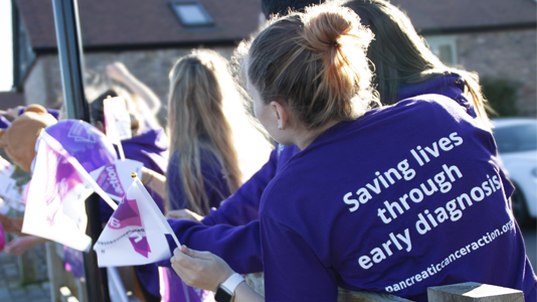Pancreatic cancer and research
Information on research into pancreatic cancer
Research into cancer is often reported in the news and it can feel as though you are being given different information every day.
The pages here will explain the process of research, answer some common questions about research into pancreatic cancer and help you to understand more about the stories you may read.
-
Research is the process of investigating a problem, increasing knowledge or creating something new. Medical research examines the causes, diagnosis and treatment of disease. Pancreatic cancer research aims to discover why the disease happens and how to prevent it, signs and symptoms, best treatments and how to improve quality of life for patients during their disease and beyond.
Research is broken down into several stages, and it can take many years to get from an idea to a result. Research does not always end in a positive outcome or result in a new medicine or insight; many studies fail to show effective results. However, this still provides insights into what does not work, so they can focus on what does.
-
There are many ways of carrying out research depending on the question to be answered, the evidence that already exists and the kind of resources available. How reliable research is depends on the type of study and how well it is carried out. Some research is therefore considered better quality than others.
Types of research and the process of developing new medications or interventions are described below. Research often begins with observational studies or an early discovery and develops into clinical trials. Through each stage of research, results are considered more reliable.
-
Research into detecting, treating and curing cancer is reported in the news quite often. Newspapers often report medical news, and it can be difficult to know exactly what to believe. You may feel as though you are being told that something is good for you one day and bad for you the next. When looking at a news article or reading about a piece of research, it may help to consider the following points:
- Was the research carried out in humans, animals or neither? This can help to show you how far through the research process the study is. A study in mice for example is many years away from having a significant effect in humans. Whereas a clinical trial, while still years from success, may be more promising.
- Is the research published in a medical journal? This means that fellow researchers and experts in the field are likely to have reviewed the research and consider it to be trustworthy and reliable.
- If the research was carried out in humans, does the article say anything about the number of people? In general, the larger a sample size, the more accurate the information produced is.
- Does the research list its limitations or areas for further study? This can help to tell you what the authors think their study may mean in real life terms and what the studies weaknesses are.
- Does the author give any evidence to support what they are saying? Do they use quotes from the researchers or give any figures or statistics? Do they reference their work? This can help you to understand what the research is and where it comes from.
If you use this critical thinking to read any news or research that you come across, not just about pancreatic cancer, you may develop a better understanding of the research and what it means.
Research we fund
Pancreatic cancer is the fifth biggest cancer killer in the UK, with only 7.9% of patients surviving 5 years. However, in patients with operable pancreatic cancer, this 5-year survival rate increases from 7.9% to 29%.
Currently, operable pancreatic cancer is only available for those diagnosed in the early stages of the disease, where the cancer has not yet spread beyond the pancreas. Currently, only 10-20% of patients are diagnosed in time for life-saving surgery, otherwise, there is no cure. Despite these clear and present challenges, the combined UK Government and voluntary sector investment into pancreatic cancer research is only 6.13% of the total cancer research funding.
Pancreatic Cancer Action is committed to funding research projects to aid early diagnosis and improve these statistics.
The following research projects set out how we will put our words into action and help make our vision a reality. They demonstrate how we will both fund and support innovative research, to improve early diagnosis and develop effective treatments to improve pancreatic cancer outcomes.
Current research activity
Current research activity and surveys that could help pancreatic cancer outcomes and treatments for patients.
-
Name of organisation: University of Sheffield.
Funded by: Self funded PhD study.
Aim of research study: Explore the experiences of scanxiety for adults with mesothelioma, pancreatic, brain and liver cancer and the associated care and support needs and, identify an intervention to help improve scanxiety.
Outcome hopes for study: Raise scanxiety awareness, Develop the understanding of scanxiety, Improve people's scan experiences, Understand and improve the care and support needs of adults with mesothelioma, pancreatic, brain and liver cancer experiencing scanxiety.
Time to complete: 10 minutes to complete the online survey
Deadline: 08/07/26
Contact details: Caitlin Lusted clusted1@sheffield.ac.uk
Link to survey: here
-
Name of Organisation: Queen's University Belfast
Funded by: NINE DTP
Aim of research study: To test a digital booklet on adolescent loneliness when a parent has cancer to see if is acceptable to young people experiencing/ who have experienced a parent with cancer.
Outcome hopes for study: To publish our digital booklet and share it with services who might wish to provide it on their websites or directly to parents/ young people.
Time to complete: The study is an interview on Teams lasting maximum of one hour.
Deadline: End of Feb 2026
Contact details: lmckeown38@qub.ac.uk
-
The Safe-D clinical study for early detection of pancreatic cancer
Name of organisation: Southampton Clinical Trial Unit, University of Southampton
Funded by: ClearNote Health, San Diego, USA
Aim of research study: This randomised study aims to evaluate a novel blood test (Avantect) to detect signals of the presence of pancreatic cancer in participants (50-84 years old) recently diagnosed with type 2 diabetes (within 6 months). Participants in the intervention arm who have a detected Avantect test result will be referred by the study team for further pancreatic cancer investigations (MRI scan) as per standard of care.
Outcome hopes for study: Detection of pancreatic cancer at an early stage when treatment options (surgery) are still available.
Time to complete: The study has a pilot phase to evaluate recruitment strategies which ends at the end of September 2025. If successful, recruitment to the full study will run for an additional 2.5 years to end Mar 2028.
Deadline: Currently open for recruitment into the Pilot.
Clinical nurse specialists
Since August 2018, Pancreatic Cancer Scotland and now Pancreatic Cancer Action has been fully funding an innovative new role; a Clinical Nurse Specialist within the West of Scotland Cancer Network. The role provides additional resources, helping support patients and families understanding of clinical trials and has contributed to enhanced participation and recruitment of patients to clinical trials, including the Precision-Panc study. The success of this role demonstrates how a collaborative approach with the third sector, healthcare professionals and research programmes can make a real difference. Recruitment to clinical trials for pancreatic cancer has been an ongoing struggle due to the poor survival rate. A clinical nurse specialist is a key tool to improve both patient care and support research opportunities.
We have exciting plans to continue funding research, but we need your help!
Research we have funded
Pancreatic Cancer Action has funded several projects investigating the early diagnosis of pancreatic cancer. This has allowed researchers to examine several new ways of looking at the disease.
Research part or fully funded by Pancreatic Cancer Action has been important in the development of potential biomarkers to diagnose pancreatic cancer earlier, in some cases, before symptoms appear. Many of these studies have gone on to receive grants from other organisations to help the work move further.
-
Pancreatic Cancer Action funded a project from Dr Tatiana Crnogorac-Jurcevic and her team studying potential biomarkers for pancreatic cancer in patient’s urine. The project looks at urine as a sample that is easy to collect and avoids invasive testing.
The team examined a series of proteins that may act as biomarkers, identifying patients who have pancreatic cancer via a simple test. Original results showed promise for some potential biomarkers when used with CA19-9, the most accurate biomarker currently in use. This research has now been expanded with a grant from Pancreatic Cancer Research Fund (PCRF) to test accuracy and reliability over a four-year study in patients.
-
In partnership with Pancreatic Cancer UK and the Scottish Chief Scientist Office, we have pancreatic cancer researchers who set out to investigate how the disease grows and spreads and aim to discover new treatments.
Five PhD students were recruited to the new Future Leaders Academy, and conducted four years of research at the Cancer Research UK Beatson Institute in Glasgow. The hopes are that the students would not only make vital breakthroughs in understanding and treating the disease but will also remain committed to the disease throughout their careers and help to solve another key challenge facing pancreatic cancer research.
-
Determining the difference between type 2 and type 3c diabetes
The first research project was produced in partnership with a University of Surrey research team led by Dr Agnieszka Lemanska. The aims of the study were to confirm the link between diabetes and pancreatic cancer and to examine the differences in diabetes management and primary care presentation between patients who go on to develop pancreatic cancer and those who do not.
The project was a retrospective case-control study, interrogating the RCGP database to provide a large sample size of cases and controls. Multiple variables can be examined from demographics to diagnostics, number of presentations at primary care to disease management. The project involves examining the GP records of patients with diabetes who went on to develop pancreatic cancer and those who did not develop the disease. Records will be taken from the RCGP database, where approximately 9.5 million patients’ data are stored. This allows a large sample of patients to investigate.
The study will compare the records of patients to find any differences in their demographics, such as BMI and age. Comparisons can also be made in patients’ journeys, both in the control and development of their diabetes, and other symptoms presented at GP appointments.
-
Studies originally funded by Pancreatic Cancer Action have resulted in a grant from Cancer Research UK to study the link between type 2 diabetes and pancreatic cancer. Dr Eithne Costello and her team at the University of Liverpool conducted a study where patients will have blood tests to identify if their diabetes is type 2 or the rarer type 3c diabetes and if this is a result of pancreatic cancer. The test aims to identify biomarkers of type 3c diabetes and/or pancreatic cancer. You can read more about the study here: Blood levels of adiponectin and IL-1Ra distinguish type 3c from type 2 diabetes: Implications for earlier pancreatic cancer detection in new-onset diabetes – ScienceDirect
If researchers can discover a marker in the blood (also known as a biomarker) that can distinguish between the two types of diabetes, or diabetes caused by pancreatic cancer, it could give doctors a simple tool for diagnosis in these people.
Other research
-
Much of the research that takes place into cancer is called clinical research. This involves designing or identifying a medication or intervention that may improve the diagnosis or treatment of a disease.
This idea is then repeatedly tested or developed through research and clinical trials. Before a medication or intervention is licensed and given to patients it will have been tested using a variety of methods. These tests will determine the safety and effectiveness of the intervention or medication. New medications or interventions need to be practical, cost-effective and appropriate.
The process of clinical research is long, and many new discoveries or ideas don’t make it to the licensing stage. Research also relies on funding and on patients and volunteers taking part. The page below describes the research process that takes place to find and develop interventions or medications for cancers, including pancreatic.
1. Discovery and early research
Research into new medications or interventions (such as scans or surgeries) for a disease normally begins with research scientists. They may work in a university or private lab trying to understand a disease and the processes which cause it. They will look at the cells involved in the disease to understand how they work and what kind of medication or intervention may disrupt or kill the disease itself or any cells that are not working properly.
Once this is understood, scientists can look at new or existing methods for medicines and interventions. These can come from natural products such as plants, existing medications and interventions or new man-made products, designed using computer models.
2. Preclinical trials
Potential candidates for medicines or interventions in a disease are tested using computer models, cells and animals in pre-clinical testing.
Computer models can provide a prediction of how a new intervention will work and cell models can confirm this using live cells that make up animal or human bodies. However, these tests are outside of the complex environment of the body and, therefore, cannot be relied upon as the only evidence.
Animal models are sometimes used in place of humans to limit the amount of harm that can be caused to humans during clinical trials and to see if the intervention works as well as predicted. Often, mice are used for research, they are mammals like humans. However, tests in mice cannot give the same effect as those in humans and often, differences are observed between the two.
3. Clinical trials
Clinical trials are medical research studies where an intervention or treatment is offered to people to test how well it works compared to the current standard. Trials are carried out because the benefit of a treatment or intervention is currently unknown. It may be better, the same, or sometimes not as good as standard treatments.
Depending on how far through the testing process a drug is depends on the kind of trial you may be asked to take part in. Clinical trials usually have up to three phases, and information gathered in each phase helps researchers decide whether the study can move on to the next phase and the best way to do so. In phase one and two clinical trials, the intervention is received by everybody taking part (single-armed trial). The third phase can involve comparing to existing treatment, a placebo (such as a sugar pill) or no treatment.
4. Licensing and approval
If a medication or intervention passes all these tests it can be licensed and investigated as a potential treatment to be used by the NHS. Each country within the UK has organisations which advise the NHS on the best ways to diagnose, treat and manage diseases. They look at how cost-effective new interventions are and what the benefits will be to patients.
Once an intervention is in use, it will be monitored to make sure that it is safe and working as predicted. If this is a medication, then an instruction leaflet should be provided with information about dose, the way the medicine should be taken and any side effects. Doctors will be able to report any concerns they have about the medication for further investigation and clinical trials will continue to either examine issues with the medication or find new uses for it.
Pancreatic Cancer Action and clinical research
Pancreatic Cancer Action funds clinical research into the early diagnosis of pancreatic cancer. We currently fund the research of PhD students and seed fund other projects.
-
If research is examining factors that may make pancreatic cancer more or less likely, (for example the effect of diet or smoking), observational studies are often the chosen type.
Observational studies can take place prospectively, (before a disease has occurred) or retrospectively, (reflecting on a disease at how it may have developed).
The observational studies with the most widely accepted results follow large groups of people over a long period of time. One group who take part in the behaviour the study is interested in (i.e. smoking) and one group who do not. At the end of the study, the differences in cancer rates in the two groups would be compared. Observational studies for pancreatic cancer have previously looked at things like allergies and diet and their effect on the chances of getting the disease.
Observational studies can show that there is an association between a factor or behaviour and pancreatic cancer. The results of observational studies often need to be confirmed using repeated or different types of study. It is unlikely that you would be asked to take part in an observational study. But if you do, you are contributing towards knowledge of pancreatic cancer and how to prevent it.
Pancreatic Cancer Action and observational research
Pancreatic Cancer Action funds and takes part in research into pancreatic cancer, focusing on our aim of early diagnosis. We carry out survey research into symptom and risk awareness. We believe in raising the profile of pancreatic cancer amongst the public and healthcare professionals.
We produce health information campaigns on a local and regional level to increase knowledge of pancreatic cancer and prompt people to visit healthcare professionals with symptoms. Alongside this, we work with pharmacies and GPs to encourage them to think pancreatic cancer and increase early diagnosis of the disease. PCA measures the outcomes of these campaigns to understand their effectiveness and the needs of different populations.
Get in touch
If you'd like to find out more about our research or how to get involved, email our Health Information and Research Manger, Heather Archbold at: healthinfo@panact.org, or call us on 0303 040 1770.
Help fund our research
Early diagnosis helps save lives. Help us reach more people than ever.
Help fund our research
The information provided in this site, or through links to other websites, is not a substitute for medical or professional care and should not be relied upon as such. Read our disclaimer.
Sources and references for this information product will be supplied on request. Please contact us quoting the Information Product number below:

- Information Product No: TBC
- Published: 20 Aug 2018
- Last updated: 2 Jul 2024
- Next Review Due: 26 Jun 2027

